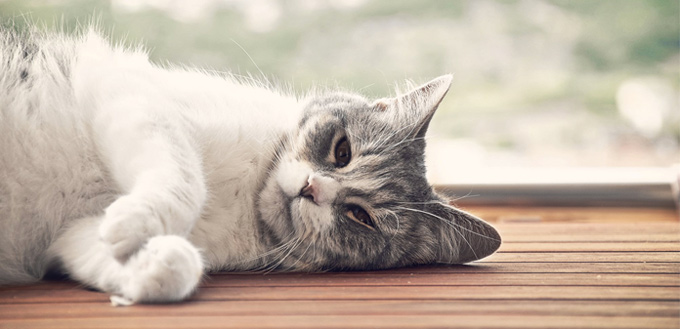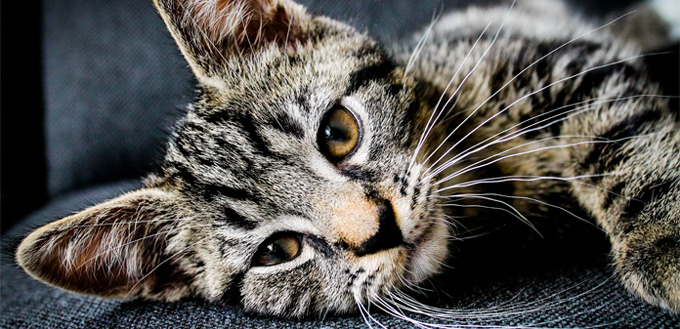Anyone who loves having a pet around the household either has a dog or a cat, and while dogs have their plus points, cats can be equally endearing, although for totally different reasons.
Cats are playful, independent and inquisitive, and are happy and content if left to explore their surroundings. However, this also means that your beloved feline creature is likely to be exposed to a variety of contagions, not all of which are likely to be good as far as its health is concerned. Chances are that while on the prowl, your cat might eat something suspicious or step over dirt and then lick its paws. The outcome, in both cases, is that of poor digestion, which in turn translates into ill-health for the cat.

For a cat to feel and look healthy, it is essential to have a proper and balanced diet. Also required is a bit of vigilance on your part as the pet owner and this alone could go a long way in ensuring good digestive health of your feline.
Tips That Ensure Good Digestive Health of Your Cat
Have you ever heard of probiotics? Also referred to as ‘friendly bacteria’ these are micro-organisms that line the digestive tract and facilitate optimal absorption of nutrients. Lactobacillus acidophilus and streptococcus are some strains of probiotic bacteria that help in treating or preventing a variety of illnesses and diseases, especially those related to the gastrointestinal system.
So, this and some other tips that could improve your cat’s digestive health are discussed as follows.
- Probiotics
Like humans, a cat’s immunity resides in its digestive tract. Thus, keeping it balanced with good bacteria is imperative for your kitty to lead a healthy and longer life. You can supplement your cat’s diet with probiotics as these will help to regulate digestion. Given that any disorder in the digestive tract of your kitty will lessen its immunity, adding probiotics will minimize the chances of digestive disorders like decreased appetite, vomiting, diarrhea, or stool changes. Other digestive problems like inflammatory bowel disease (IBD) and infections can also be taken care of by probiotics. Probiotics plant beneficial bacteria in the gut after a cat has been on a course of antibiotics. They improve digestion and boost the overall immune system.
Cat’s probiotics are available in various forms – powders, pills, and even infused inside of treats. Studies have revealed that feeding your feline probiotics builds systematic immunity by adding positive GI flora. A healthy gut reduces the possibility of diseases like diabetes and cancer. Veterinarians opine that lack of enzymes, both digestive and systematic, is a major factor that can cause harm to your kitty.
Cats respond best to Bifidobacterium and Enterococcus bacteria families. Bifidobacterium enhances digestion whereas Enterococcus aids colonic health by helping to form normal feces. Consult your vet to find out which probiotics should you use for promoting your kitty’s digestive health.
- Add small amount of veggies to your kitty’s diet
Cat’s digestive system and metabolism is geared to process high protein and high fat from meat. They require certain nutrients like amino acid taurine and fatty acid arachidonic which are only available in meat. Taurine helps in proper functioning of heart and eyes and also boosts the immunity system. This is why cats cannot be vegetarians.
However, incorporating cooked or steamed vegetables in their meals in small portions will help in boosting immunity while mitigating the effects of aging. You can add vegetables in pureed form but in lesser proportion. Your kitty’s diet should also include high-quality digestible ingredients that will lessen the intestinal workload.
- No grains diet
Cats are meant to survive off of fats and proteins, which is why a cat’s diet is a no-grains diet. Grains do not benefit cats because they lack the enzymes required to process carbohydrates. Larger amount of carbohydrates in their diet could cause digestive problems like stomach upset and intestinal discomfort. Therefore to help your kitty digest better, feed them grain free cat food and reduce or eliminate the grain content of its diet.
- Cut out dairy products
Consuming dairy products in any form can be problematic for most cats. Some felines are even lactose intolerant. Feeding milk to your cat will only serve to aggravate stomach and digestive issues.
Cats that are lactose tolerant are also adversely affected by dairy products. The protein content of dairy products is not well absorbed or utilized by your cat’s body. Your cat’s diet should be a nutrient rich diet, meaning it should be replete with ample vitamins, minerals, fatty acids and Omega 3 & 6. A high quality diet will lessen the chances of digestive complications.
- Include fibre
Including fiber in your kitty’s diet can actually help your furball to digest its food well. Both highly soluble as also insoluble fiber foods, when combined with medium levels of fat, help your feline’s intestines to function optimally. Increase the moisture content of your cat’s food by adding water. This promotes digestion and serves to eliminate dry food ingestion.

Final Word
To ensure enhanced immunity and digestive health of your kitty, there is no better alternative than probiotics. Additionally, a high nutrient diet with proper balance of vitamins and minerals, higher meat content, no grains, and hydration will keep your furball healthy, thus ensuring better digestive health.
Sources:
- Huysentruyt P, Digestion of Carbohydrates in Cats, Europe PMC
- Ryan Llera, BSc, DVM, Feeding Times and Frequency for Your Cat, VCA Hospitals
- Lisa Gorman, DVM, DACVIM, Chronic Gastrointestinal Disease in Cats, The MSPCA–Angell






